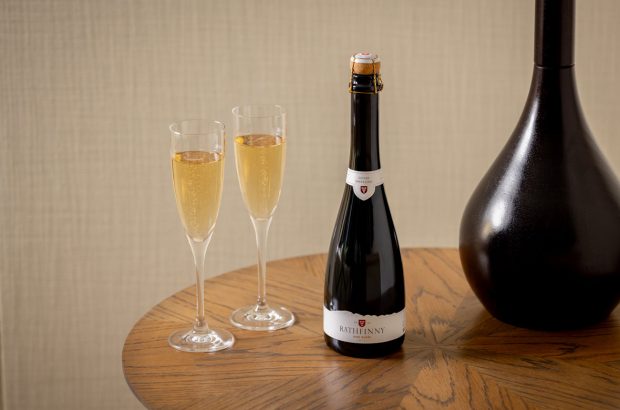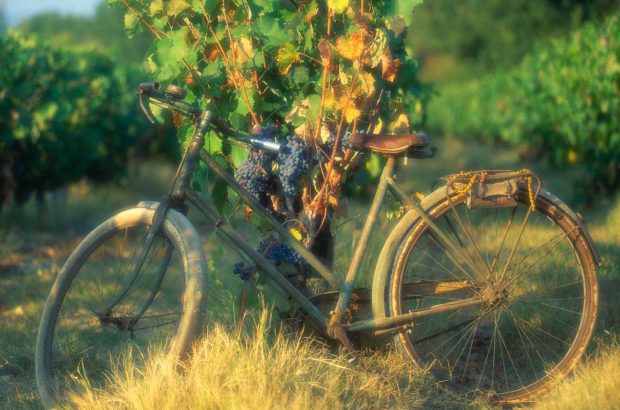Which is the better recipe for marriage success – wine nut & wine nut, or wine nut & wine novice, ponders Peter Richards
According to the American comedy writer, Gene Perret, marriage is like good wine, in that it gets better with age – once you learn to keep a cork in it. But what about a marriage based on wine itself? What if both partners are wine lovers – do the corks toll for them? Can a wine-addled relationship be more worthwhile than a one-sided affair?
I must confess at this stage that I am not a disinterested party in this debate. Having recently married fellow wine writer Susie Barrie (the happy couple are pictured, right), I have a privileged insight into the dynamics of a wine-centric relationship… and, inevitably, a vested interest in its portrayal. So, in the interests of balanced reporting, I sought the opinion of other wine lovers.
The first thing I noticed was that there were more wine lovers around than I had realised. This, surely, was a good sign. I began by asking about the advantages of being hitched to a fellow enthusiast. The floodgates duly opened for Serena Sutcliffe MW, head of Sotheby’s wine department and wife of David Peppercorn MW. ‘You almost talk in code, you have a common wine lovers language. There is a constant exchange of information and stimulation in being with someone whose professional life is wine. And you can share so much joy in it. I always feel so sorry for those who buy half-bottles as “my partner does not drink”! If we could not share bottles, or listen to music, or look at art, and discuss it and delight in it together, life would be dreary indeed.’
Mutual understanding and the ability to share wine experiences were a constant theme in replies from wine lovers to this question. ‘It never gets boring – there are always things to talk about, always things going on,’ explains Susanna Forbes, deputy editor of drinks magazine Imbibe, who is married to Wines of Argentina UK director James Forbes. ‘It’s amazing where the search for wine knowledge will take you.’
And what about the disadvantages? Surely there must be some, in the midst of all that mutual empathy and fine wine? A significant proportion of wine lovers maintained that any disadvantages were insignificant. Others were more candid.
‘When you work in the wine industry, the boundaries between work and private life become blurred and this could be detrimental to your personal relationship if ignored,’ points out a forthright Kathy Jordan, who together with husband Gary runs their eponymous South African winery. The flipside, she adds, is that, ‘wine is not only a job, but also a hobby and interest that we both enjoy.’
https://www.decanter.com/wine-reviews-tastings/10-top-south-african-wines-410292/
Allowing work to impinge on personal space is not the only potential disaster area for mutual amateurs du vin, however. ‘Going into wine shops together is an absolute nightmare,’ offers PR and events consultant Kate Sweet, who is married to Warren Adamson, director of New Zealand Winegrowers Europe’s office. ‘We’re like kids in a sweet shop, when the last thing we need is another case or £120 bill.’
Restaurants are another potential disaster for wine lovers, according to Susanna Forbes. ‘It can take forever to decide which wine to order – we’re practically at our pudding before we’ve chosen an apéritif. The sommeliers must hate it.’
As for the temptation to over-analyse and get bogged down in the minutiae of wine geekery, most wine lovers claim to be in control.
‘That can happen at the beginning, when you’re young and energetic and pontificating about every wine in front of you,’ gently suggests Chilean winemaker Felipe García, husband of fellow winemaker Constanza Schwaderer. ‘But with time you relax. Life is to be enjoyed and wine helps a great deal in this regard.’ He adds: ‘Every wine is a new opportunity to share with your wife and be happy for however long that 75cl bottle lasts.’
As regards drinking habits of wine lovers, it seems that tastes either coincide or gradually converge within these vinous couplings (failing this, mutually desirable territory is established). As Kathy Jordan comments, ‘if this wasn’t the case it would be very difficult when we are putting our own wine blends together as we would never be able to agree on the same blend!’
And of course exceptions can be made simply by keeping two bottles on the go, one for each palate. ‘Warren’s good at keeping a bottle of my favourites – Riesling or Sauvignon Blanc – in the fridge, just in case,’ confides Kate Sweet. ‘They’re in the section marked: In times of emergency, break glass and administer to wife.’
Serena Sutcliffe MW sums up. ‘We are not wine anoraks. We honestly enjoy every bottle – if we open one that we do not like, we choose another – life is too short.’ Describing their shared passion as ‘constant curiosity’, she adds, ‘The other night we launched into a bottle of 2005 Juliénas and it was wonderful. But so was the Calon Ségur 1928 the night before!’
Wine is inevitably a personal affair. This can lead to frustrations, disagreements and even hostilities, especially among impassioned types – though, happily, a calming glass of Champagne can always be trusted to work wonders (it certainly works on Susie).
But the benefits of being able to share that kind of private experience are a source of considerable pleasure in any relationship. Susie and I will always treasure the bottle of Vega Sicilia Unico 1987 we shared the night we got engaged in Salamanca. It sealed the deal in a way that needed no further words.
As for who has to keep a cork in it – ah, now that would be telling…
Peter Richards is an award-winning wine writer and broadcaster
Life in a wine marriage: Susie’s view
Chile: working press trip, spring 2004.
I step off the plane with my newly acquired wine writer fiancé. ‘Ah!’ exclaims our friendly driver and guide as we emerge from the airport. ‘Welcome to Chile; we have an extensive programme of winery visits arranged for you. We hope you have an enjoyable honeymoon.’
This is just one example of the amusing and/or frustrating incidents that have occurred since Peter and I met. But without doubt, the good things that happen on a daily basis as a result of being ‘wedded to wine’ far outweigh any of the negatives.
The truth is that we disagree (often vehemently) about the wines we taste separately, and if we were each to choose our desert island wines, the two lists would be alarmingly different. But when we taste together at home we do generally come to a consensus; we rarely disagree about truly great wines and, most importantly, we both love to try something new. Frankly, we’re too keen to get stuck in to waste time arguing.
So do I think it is difficult or irritating or annoying being married to a fellow wine writer? Certainly not – except when he orders a wine without even asking if I’d like white or red, which he did on our first date…
Susie Barrie and Peter Richards present the wine section of BBC1’s Saturday Kitchen (though never together)
Steven Spurrier is a world- leading authority on wine, and Decanter’s consultant editor. His wife, Bella, is a wine novice, but a great cook.
The main advantage of living with someone not in any part of the wine trade is that the choice of wine is always your own. Sometimes I ask Bella what sort of wine she would like to drink, but only when I have no clear personal preference. To say that she is always happy with what comes out of the cellar sounds patronising, but, given our similar tastes and what is in the cellar, this should be no surprise.
Bella is an excellent cook, not just skilled in front of the stove, but with an approach to food thanks to our 12 years in France that instilled a reticence to eat, therefore to cook, anything that does not taste of its true, natural flavours. Brought up on a farm and moving to another in southwest Dorset, even before it was discovered by Hugh Fearnley-Whittingstall, knowledge of the seasons and their produce guides whatever is placed on the table.
Faced by her simple, but thought-out menus, my mantra ‘drink for mood, not for food’ is often compromised. After an exhausting week in London, looking forward to something robust from the Rhône on Friday night, Bella might announce that she has bought two fresh crabs from West Bay for the main course. White it has to be then, but the red follows swiftly with the cheese, ignoring Michael Broadbent – and Decanter’s – advice that white is a more suitable match.
More important, though, than just getting my own way on wines, is the genuinely appreciative response they bring: ‘That’s very good, what is it?.. Oh, we haven’t had this for ages…Champagne?, how delicious.’ As a wine merchant in Paris, all I wanted was for customers to like the wines, so they would come back again; as a wine writer, I want readers to know which wines I love, and why. Wines, at any level, are there to be enjoyed and here is straightforward enjoyment with a little knowledge, but no technical baggage to get in the way.
I have always thought the female palate to be more precise than the male. Bella is quicker than I at spotting cork taint and her unprofessional analysis of wines is always direct and generally correct. Very early in our marriage we were travelling down to Bordeaux and stopped at a grand restaurant in Cahors for dinner. I ordered Haut-Brion 1952. ‘Nice, but a bit flat’ was Bella’s comment. I was furious and the following day acquired a copy of Edmund Penning-Rowsell’s just-published tome on Bordeaux to prove her wrong. ‘Overshadowed by the 1953, this is a nice wine but rather flat,’ was the great Eddie’s judgement.
My eyes, wine-wise, are bigger than my private cellar’s capacity, so much is now racked in Bella’s part of the cellar, with instructions to leave them alone. To my ill humour – due to a missing bottle of Barolo Bussia 2001 Podere Colla – Bella replied, ‘I was cooking partridge for myself and you have always said Barolo is good with game’. Buying wine is a selfish habit: having it appreciated in this way makes me feel generous.
Life with an expert: Bella Spurrier
What’s it like to be married to a wine nut? (Well, more of an expert I suppose.) If there is a downside I haven’t found it. To start with, wine is a great door-opener, it brings the opportunity to meet really interesting people on their home ground. Not to mention seeing some amazing houses and estates. The price for this is admiring many bottling lines, and occasionally having to bluff one’s way through impossibly long tastings while yearning for lunch – but it’s a price well worth paying.
As for the cellar, it’s full of good stuff and I have my rack, carefully filled by Steven as he doesn’t trust me to buy anything decent… which is fine by me.
Steven is never a wine bore – he just wants to share his passion, not show off his knowledge. Could this be the difference between a nut and a professional? Wine nuts are Boring! All that going on about temperature, and where they got it, and how much for, and how they know the producer/importer etc, even if you haven’t asked. Steven knows all this, he just doesn’t bang on about it.
Actually there is one downside… it is virtually impossible to persuade a winey spouse to visit a non-wine producing country on holiday, however attractive. We did go to Ireland, once.




